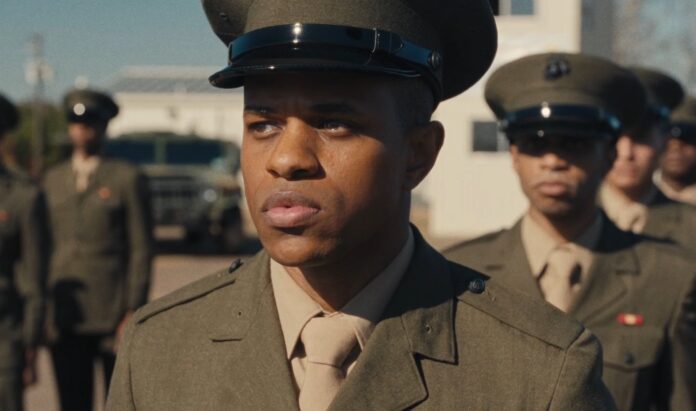The intense, outstanding film, “The Inspection,” opening December 2, depicts the difficult experiences of Ellis French (out actor Jeremy Pope) in boot camp as he trains to be a marine. Based on out gay writer/director Elegance Bratton’s life, the film traces how French finds his place in a world that does not want him.
The 25-year-old French is first seen living in a homeless shelter. His mother Inez (Gabrielle Union) has kicked him out of the house when he was 16 for being gay. She does not approve of his “lifestyle,” and when he visits her to collect his birth certificate to enlist, she puts newspapers down on the couch so he does not “contaminate” her furniture. She hopes that the marines will shape him up to be the young man she wanted — not the gay man he is.
The lack of options in French’s life have prompted him to join the military, and he encounters more hurdles at boot camp. It is not just the grueling physical training, which Bratton films in a style that is equally raw and poetic. Viewers will practically vibrate at the sound of drill sergeant Laws (Bokeem Woodbine) and kill hats Rosales (Raúl Castillo) and Brooks (Nicholas Logan) as they shout at the recruits to break them down. The physical and mental tests French and his fellow recruits endure is palpable, and why “The Inspection,” which can feel like an endurance test, is so powerful.
Yet as difficult as the film can be to watch at times, it is consistently engrossing. French is sympathetic, and viewers will root for him as he rises to the various challenges in boot camp. He is admirable pushing himself in an effort to become squad leader, and there is some amusement when he “gays up” his warpaint. French also suffers some setbacks, most notably in a communal shower, when he loses himself in a fantasy about Rosales, and is brutally beaten for his visible indication of a same-sex attraction. (The film is set in 2005, during the “Don’t Ask, Don’t Tell” era.) Another sequence, where he is punished for stepping out of formation, French is forced to eat a fly he swatted, because he moved without being told.
Bratton shrewdly presents these dehumanizing moments, and they stand in stark contrast to the few instances where French gets some emotional support. One critical scene, an exercise where the recruits must save a drowning man, is sadistic, and almost prompts French to quit. However, Rosales takes him aside and counsels him, putting a hand on French’s thigh in a moment of tenderness. Moreover, a wink Rosales gives French in an earlier scene is another sign of camaraderie, but French imagines it to perhaps mean something more.
“The Inspection” is largely episodic as French navigates military life with its rigid codes of conduct. He does find some alliance with Ismail (Eman Esfandi), a Middle Eastern recruit who is also targeted by the others in boot camp. (The wounds of 9/11 are still fresh.) A scene where Ismail is literally sitting against a target during a shooting exercise is as intense as some of the traumas French experiences. A scene where the two men bond over their difficulties provides a measure of hope for these outcasts.
To the film’s credit, Bratton does not sugarcoat the situations or the characters. This is a potent drama, told with both conviction and empathy. When Laws and Rosales have a conversation about their different approach to training, it is very revealing. Likewise, Inez’s attitude towards her son and the “dream” she had for him, remains unwavering. The scenes between mother and son are riveting, especially during a heated exchange they have near the film’s end. But the point of “The Inspection” is how French earns respect, from Laws, from his mother, and even Harvey (McCaul Lombardi) the squad leader who has it out for him.
As French, Jeremy Pope gives a remarkable, internal performance. His eyes express so much of what he is thinking and feeling because so much of his screen time requires him to be poker-faced. The few scenes where he can drop his guard are interesting because he shows himself to be sensitive to the struggles Ismail and even Rosales are facing.
In support, Raúl Castillo is top-notch, advocating for French and even helping him in several situations, but also clear to draw the line when French oversteps. Castillo’s speeches to French, Laws, or even a call to his wife, reveal the conflict Rosales faces in wanting to do the right thing in a system designed to restrict emotion and critical thinking.
Gabrielle Union also makes a strong impression during her few scenes. As a mother who loves her son but not who he is, Union makes Inez a force as dominant as Laws in the film.
Bratton provides viewers with much to process about race, sexuality and masculinity, and how young men like French must learn to survive in order to thrive. “The Inspection” is a tough but rewarding film. Don’t miss it.

